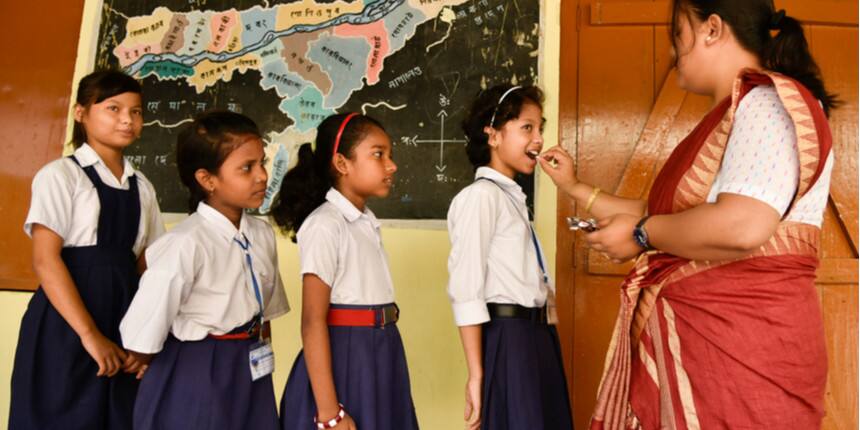NEP 2020 a 'deliberate step backwards': Science educators on Teachers' Day
Abhijit Srivastava | September 5, 2021 | 01:28 PM IST | 4 mins read
All-India People's Science Network has criticised how NEP 2020 is being introduced 'unilaterally'.

NEW DELHI: On the occasion of Teachers' Day science educators associated with the All India People's Science Network have issued a searin statement opposing the National Education Policy 2020, passed by the Union Cabinet in July last year.
The AIPSN has especially objected to the "strong centralising tendency" in the NEP which, unlike the previous policy, was never tabled or debated in Parliament before being adopted. The group has also criticised the "jaundiced view" of Indian culture the NEP allegedly promotes "by marginalizing and demeaning all non-Sanskritic-Vedic or Hindu traditions against the historical syncretistic, pluralist and multi-cultural civilizational and Constitutional values of India".
The complete statement is given below.
AIPSN Teachers' Day statement
Save Education Day All India People's Science Network (AIPSN) has been actively engaged with a critical appraisal of the Union Government’s proposals for a new education policy since its release as a draft DNEP 2020 calling for comments from the public, then as a finalized National Education Policy (NEP) document with many changes to the earlier draft but without rationale or explanation of responses to suggestions received, and finally to the aggressive roll-out of the NEP without discussion in Parliament or the States despite Education being a Concurrent subject.
AIPSN’s detailed critique of NEP, highlighting the many objectionable and undesirable aspects of NEP, have been widely discussed and disseminated. Critiques by numerous educationists, scholars and others are also available. Some States have adopted resolutions by their Assemblies opposing the NEP and several State Governments have either opposed it or have expressed reservations.
Yet the AIPSN is dismayed that the Union Government has proceeded to implement the NEP unilaterally, totally ignoring all opposition, criticism and suggestions even from States which are Constitutional stakeholders in the subject of Education.
The AIPSN is continuing its nationwide campaign against the NEP launched in early 2020, both on its own and in collaboration with other stakeholder organizations of college and university faculty, school teachers and student organizations, all having formed the Joint Forum of Movement on Education (JFME). Together, we have decided to observe 5 th September 2021, Teachers’ Day, as “Save Education Day” and many different activities around this Theme are being organized by AIPSN across India.
AIPSN’s campaign opposing NEP, along with broad-based coalitions of stakeholder organizations such as the JFME, educationists, experts and civil society organizations, will also continue throughout the country in the form of State and District Conventions, webinars while Covid restrictions are on and through large public rallies when restrictions are lifted, and mass contact programmes down to the small town, block and village level.
AIPSN firmly believes that NEP is detrimental to the future of our country and that of our youth in this knowledge era. Instead of broadening the base of mass education up to upper secondary level through increased investment in public education, as every developed and emerging middle-income country has historically done in North America, Europe and East Asia, NEP withdraws the State from education and leaves it to individual choice upon unequal economic ability, and to unstructured processes dominated by private and corporate interests without any clear linkage to employment.
In a major and seemingly deliberate step backwards, instead of expanding the justiciable Right to Education Act (RtE) guaranteeing free education for 6-14 year age-groups to 3-18 years, NEP abandons RtE altogether and leaves students, especially from poor and SC/ST sections, to their own devices. In the NEP and in its roll-out, even school education is being increasingly privatized and consequent increase in drop-out rates sought to be “compensated” by distance and digital learning which, as the pandemic period has clearly shown, only underlines and exacerbates the economic and digital divide. Similarly, commercialization is the operative theme in higher education where 4-year supposedly vocationally-oriented undergraduate courses with annual exit with certificates, diplomas and degrees are now offered at exorbitant fees beyond the reach of most students, but with completely unknown response of employers.
This at a time when the country is awash with what industry leaders have termed “unemployable” graduates from spurious private engineering colleges and universities which are now closing at rapid rates, leaving students penniless and jobless. The strong centralizing tendency of the present government is clearly stamped on the NEP which tramples on the rights of States with regard to curricula, role of school boards etc and super-imposes centralized structures for school and university entrance examinations, regulatory, accreditation and research funding systems.
NEP also seeks to impose a jaundiced view of Indian culture by marginalizing and demeaning all non-Sanskritic-Vedic or Hindu traditions against the historical syncretistic, pluralist and multi-cultural civilizational and Constitutional values of India. When all experts are recommending moving away from rote learning and de-emphasizing exams, NEP goes the other way and imposes a centralized “exam raj” at classes 3, 5, 8, 10 and 12! This central domination is also evident in the NEP rollout by the Union Government by-passing State Governments and pushing NEP implementation through circulars from MHRD, UGC or other central agencies, and through state-level committees of bureaucrats and direct dealings through the bureaucracy especially the IAS. AIPSN pledges on this Save Education Day, to work with JFME and other stakeholders, teachers, students and parents to oppose and reverse the NEP, to defend and expand public education, and work to improve the education system so as to answer to the needs of all sections of India’s diverse society and to meet the aspirations of India’s youth for a bright future.
Write to us at new@careers360.com.
Follow us for the latest education news on colleges and universities, admission, courses, exams, research, education policies, study abroad and more..
To get in touch, write to us at news@careers360.com.